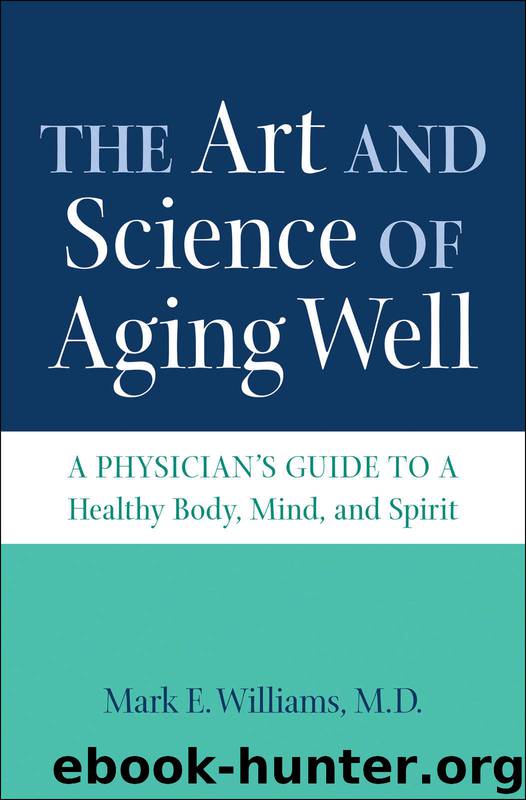The Art and Science of Aging Well: A Physician's Guide to a Healthy Body, Mind, and Spirit by Mark E. Williams M.D

Author:Mark E. Williams M.D.
Language: eng
Format: mobi
Publisher: The University of North Carolina Press
Published: 2016-06-22T06:00:00+00:00
Chapter 10: Intelligence and Creativity
You can tell whether a man is clever by his answers. You can tell whether a man is wise by his questions.
— Naguib Mahfouz
Learning acquired in youth arrests the evil of old age; and if you understand that old age has wisdom for its food, you will so conduct yourself in youth that your old age will not lack for nourishment.
— Leonardo da Vinci
According to anthropologists, millennia ago Homo sapiens made an evolutionary leap in brain capacity, from which emerged three crucial capacities. One of these is consciousness—our awareness of the self and our ability not just to know but to know that we know.
In modern times the sculptor Auguste Rodin powerfully celebrated this consciousness in his statue The Thinker. In the arts and philosophy, human consciousness has often been applied to appreciating the sheer wonder of the world, the power of sexuality, and the mystery of death. Man is perhaps the only animal that knows his ultimate fate: he is going to die.
The second capacity is language, the ability to symbolize the world and arrange word symbols into a discourse. Playing with those mental symbols, we create first stories and then abstractions—in short, we create our worlds. Language has an enormous influence over what we think of as reality, as evidenced by the vastly different worldviews of different peoples and cultures. It is with word-based pictures of our physical, emotional, and social worlds that the consciousness of the young can be molded. The third crucial capacity of humans is the creation of culture, which derives from self-awareness and language capacities.
What these capacities mean for us is that our minds—the ability to think, remember, and create—are at the essence of who we are. The nuances in our intellects and creativity change in old age just as they do in every stage of life. But by and large, old age for most people brings not a diminishing of thought and consciousness but a deepening.
DOES INTELLIGENCE DECLINE WITH AGE?
This question has been hotly debated. When testing groups, researchers have found that older people seem to do less well than younger people on standard intelligence tests. But when individuals are followed over time, very little decline is seen. Tests of verbal skill such as information retention, vocabulary, and comprehension appear to remain steady. On the other hand, tests of performance such as the speed of copying a complex diagram seem to decline over time.
It may be that traditional intelligence tests are not appropriate to measure intellectual functioning as we age. First, the fact that the speed of the response is given significant weight in these tests puts older people at a disadvantage. As discussed in Chapter 9, processing speed naturally diminishes with time, though that does not necessarily mean that an older person would fail to arrive at the correct answer. Moreover, as we age we tend to be more cautious and less willing than younger people to make a mistake in judgment. In real-life situations such caution has
Download
This site does not store any files on its server. We only index and link to content provided by other sites. Please contact the content providers to delete copyright contents if any and email us, we'll remove relevant links or contents immediately.
The Body: A Guide for Occupants by Bill Bryson(5082)
The Longevity Diet by Valter Longo(5058)
Ikigai by Héctor García & Francesc Miralles(4247)
Limitless by Jim Kwik(3168)
The Checklist Manifesto by Atul Gawande(2848)
The Body by Bill Bryson(2620)
Memory Rescue by Daniel G. Amen(2418)
What Color Is Your Parachute? 2015 by Richard N. Bolles(2306)
Breath by James Nestor;(2297)
Becoming Myself by Irvin D. Yalom(2250)
Fat for Fuel by Joseph Mercola(2008)
Memory Rescue: Supercharge Your Brain, Reverse Memory Loss, and Remember What Matters Most by Amen Dr. Daniel G(1975)
Awakening Your Ikigai by Ken Mogi(1814)
The Daughter's Return by The Daughter's Return(1795)
Weight Training by Thomas Baechle(1771)
50 After 50 by Maria Leonard Olsen(1714)
Starting Over (Sugar Creek Romance ) by Jordan Silver(1686)
1610396766 (N) by Jo Ann Jenkins(1673)
Dirt by Bill Buford(1671)
